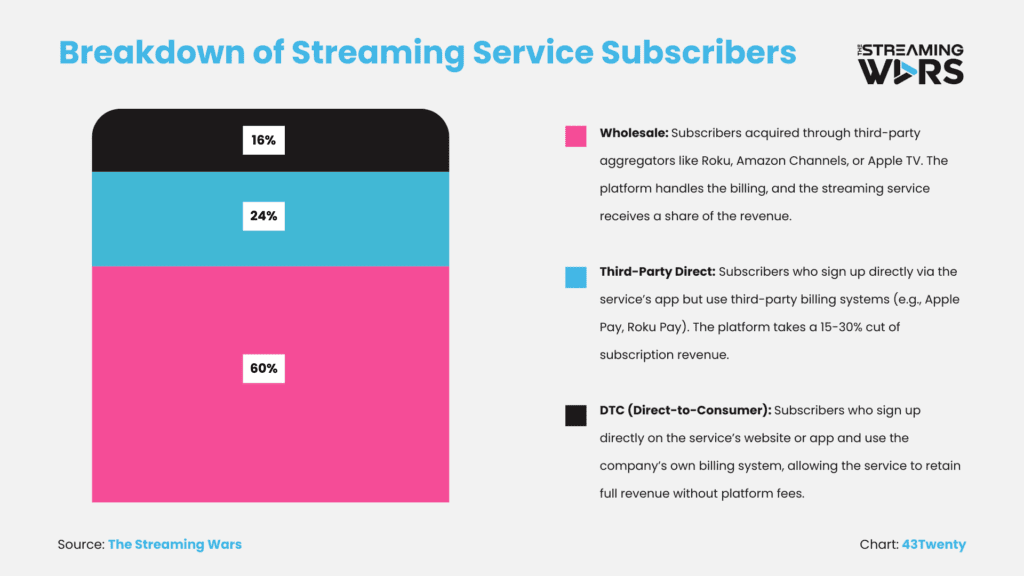Disney’s latest move to strip in-app purchase options for Hulu and Disney+ subscribers through Apple’s App Store marks a significant shift in the ongoing battle between streaming video services and app platforms. As Disney nudges its users to sign up directly through its website, the company aims to keep more revenue in-house and avoid Apple’s hefty platform tax. This strategic maneuver comes when Disney has also increased subscription prices for its streaming services.
Here at The Streaming Wars, we’ve covered these developments very closely. We’ve had conversations with senior leadership across media companies, and our exclusive coverage of the industry’s ongoing tension between content owners and distribution platforms suggests this move by Disney is part of a broader industry-wide trend.
Disney Ditches Apple’s Platform Tax
Starting this month, new users of Disney+ and Hulu can no longer subscribe via Apple’s in-app purchase mechanism. Disney will retain complete control over its subscription revenue by handling sign-ups and billing directly through its site. Existing customers can still manage their subscriptions through Apple. Still, Disney’s decision sends a clear signal: platform taxes, which bite into profit margins, are an unnecessary burden on the streaming industry.
The decision to sever ties with Apple’s in-app payment system follows in the footsteps of other major players like Netflix and Spotify. These companies have also resisted the App Store’s commission structure, which requires a 15-30% cut of each subscription in perpetuity. While Apple has slightly softened its stance by allowing “reader” apps to direct users to external websites, content providers increasingly prioritize direct-to-consumer (DTC) models to reduce costs and control customer relationships.
The Industry Shift: Breaking Free from Third-Party Platforms
One of the most misunderstood concepts in the streaming industry is the term “direct-to-consumer” (DTC). Many in our industry think that simply offering a standalone app qualifies as DTC, but that’s far from the truth. When a user signs up for a service like Disney+ through the standalone Disney+ app on an Apple device, but the payment is routed through Apple Pay, that transaction is not truly direct-to-consumer. Why? Because Apple still controls the payment infrastructure, and takes a 15-30% cut of the subscription revenue. This means Disney loses a significant portion of the subscriber’s fee and forfeits control over valuable customer data.

This is why platforms like Disney+ and Hulu are moving away from app store billing systems. By handling their own billing infrastructure—like Disney does when users sign up through its website—they avoid this “platform tax” and maintain full control over customer relationships, data, and revenue.
Streaming companies like Disney, Starz, and BritBox want to own the entire transaction—billing, customer service, and data analytics—without intermediaries taking a cut or controlling any part of the user experience. This shift is central to the ongoing industry effort to redefine what it truly means to be “direct-to-consumer.”
Tensions Brewing: Platform Taxes and Industry Frustration
At The Streaming Wars, we have examined the industry’s growing frustration with platform taxes. This issue has been brewing for some time, and Disney’s latest move only underscores the contention. Recently, we broke the news of the Starz and Britbox bundle, which also seeks to bypass third-party platforms by using its billing infrastructure. This trend is part of a broader strategy by media companies to reduce their dependence on distribution gatekeepers like Apple, Amazon, and Roku and instead focus on growing their DTC subscriber base.
The bundle between Starz and BritBox is a perfect example of how streaming services are reclaiming control over their revenues and customer data. By managing the billing and distribution internally, Starz and BritBox avoid paying platform taxes and maintain full control over customer relationships.
The Future of Streaming: Who Controls the Revenue?
In conversations with various media executives, we’ve heard a common refrain: platform taxes are a significant pain point. Whether it’s Apple, Google, Roku, or Amazon, streaming services feel squeezed by the platform taxes imposed by app stores. By pulling its subscriptions from Apple’s App Store, Disney is just one of many companies seeking to buck the system.
The larger question is: how long will media companies tolerate these platform taxes before we see an even broader shift toward direct consumer engagement? We at The Streaming Wars expect more services to follow Disney’s lead in the months and years ahead as the battle over revenue control between content owners and platform distributors heats up. I even called this issue out in 2018.
If you think The Streaming Wars are over, you couldn’t be further from the truth—this is just the beginning of a new phase in the fight for control, revenue, and customer relationships.
Read our analysis on how these platform tax disputes and the growing resentment toward third-party distributors are shaping the future of the streaming industry.







